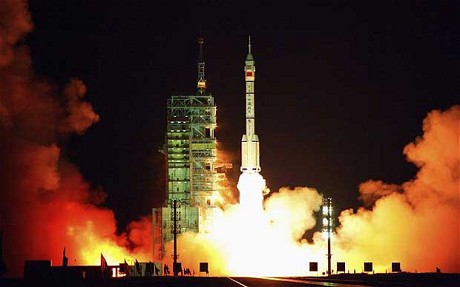Beijing is less likely to seek astral dominance if it is treated as a partner, not a pariah.
By Gerard De Groot
Ever since the first rocket shot, man has fantasised about the strategic potential of space. Just after the launch of Sputnik, for instance, one analyst advised detonating an atom bomb on the Moon, purely for dramatic effect. Another starry-eyed strategist proposed crashing two rockets on to the lunar surface, one filled with blue powder, the other with red. That would make the Moon red, white and blue, just like the American flag. How cool is that?
These ideas quickly burned up in the atmosphere of President Dwight Eisenhower’s good sense. He understood perfectly the danger of allowing soldiers and scientists to gather together and dream. In his farewell address, he warned Americans about the “military-industrial complex” and the possibility “that public policy could become the captive of a scientific-technological elite”. That speech was directed, in particular, at Nasa.
When John Kennedy entered the White House, sanity again gave way to lunacy. JFK saw space as a “high ground” that Americans must occupy. “If the Soviets control space, they can control the Earth, as in past centuries the nation that controlled the seas dominated the continents.” That “high ground” idea never went away. It was, after all, the inspiration behind Ronald Reagan’s Star Wars programme, which had the great defect of being physically impossible, not to mention economically unaffordable. George W Bush nevertheless revived the plan, which he thought might be useful against terrorists. (Don’t ask.)
Recently, the US Air Force has proposed development of “hypervelocity rod bundles” or “Rods from God”. These weapons would involve sticks of tungsten, titanium or uranium hurled from deep space. Hitting Earth at 7,200mph, they would effectively be man-made meteors. (At this point, the reader is free to ask “Why?”)
What no one has yet explained is how space can ever be “controlled”. It is, after all, rather big. Fortunately, in recent years, sanity has returned to American space policy, for the simple reason that the US is now broke. Americans seem also to have realised that they no longer possess the enemies against whom space weapons might be useful. We’re currently in the longest period of peace between great powers since Roman times. Major war seems unthinkable.
Or so it appears. The joker in the pack is China. No one knows quite what they’re planning to do in space. Recent musings from Beijing – highlighted in a new Pentagon report – sound a lot like what Kennedy was saying 50 years ago, with occasional reference to “space dominance”. Evidence suggests that they might be developing a comprehensive capacity to disable satellites. The effect of such a strike would be catastrophic, instantly paralysing the world’s communication and transportation systems.
In a rather disturbing article published a fortnight ago, Dean Cheng speculates on Chinese space intentions and concludes by advocating a more “robust” American military space capability. In other words, he wants the tit-for-tat escalation we saw during the Cold War. Granted, Cheng works for the Right-wing Heritage Foundation, where analysts are paid to panic. None the less, we do perhaps need to pay attention to Chinese behaviour in space.
The big question is why the Chinese might want space dominance, since they are well on their way to the terrestrial kind. Simply by selling things to the rest of the world they’re set to achieve the kind of empire Hitler once coveted, without having to kill anybody. In this scenario, aggression seems ludicrous, since what advantage lies in a shopkeeper killing his customers? The Chinese seem to understand this, as evidenced by the fact that they do not have the massive military capability that once went with great power status. But then why are they practising shooting satellites with lasers? Cheng seems to think that China’s suspicious behaviour in space might be the symptom of a rift between hardliners in the People’s Liberation Army and more pragmatic politicians. Another explanation might be that it’s not the Chinese who are being inscrutable, but the Americans. The Chinese are rightly worried about how the US will react when economic dominance inevitably shifts eastward. They probably feel safe with Obama, but fear what a President Palin might do to restore American prestige.
In other words, given uncertainty in Washington, a bit of careful planning for war in space makes sense.
Space is undoubtedly a strategic asset. Modern society is dependent upon satellites in ways most of us cannot remotely imagine. Their destruction would cripple our communications systems, imperil our safety and send stock markets into freefall. Protecting the system militarily is not feasible, despite what space enthusiasts claim. Putting weapons into space would simply initiate a new arms race.
We must take solace in the fact that global communications and international trade has brought the world closer together. In other words, dependency has to be recognised as an asset. Given our mutual reliance on fragile satellites, advanced nations – including the Chinese – must learn to swim together, or risk sinking as one. That means keeping weapons out of space and co-operating to advance space science for the benefit of all. Quite simply, China needs to be brought into the orbit of nations. The reason China acts like a pariah is perhaps because she has so long been treated like one.
Gerard De Groot is author of ’The Dark Side of the Moon’.
See online: As China gazes upwards, watch this space

